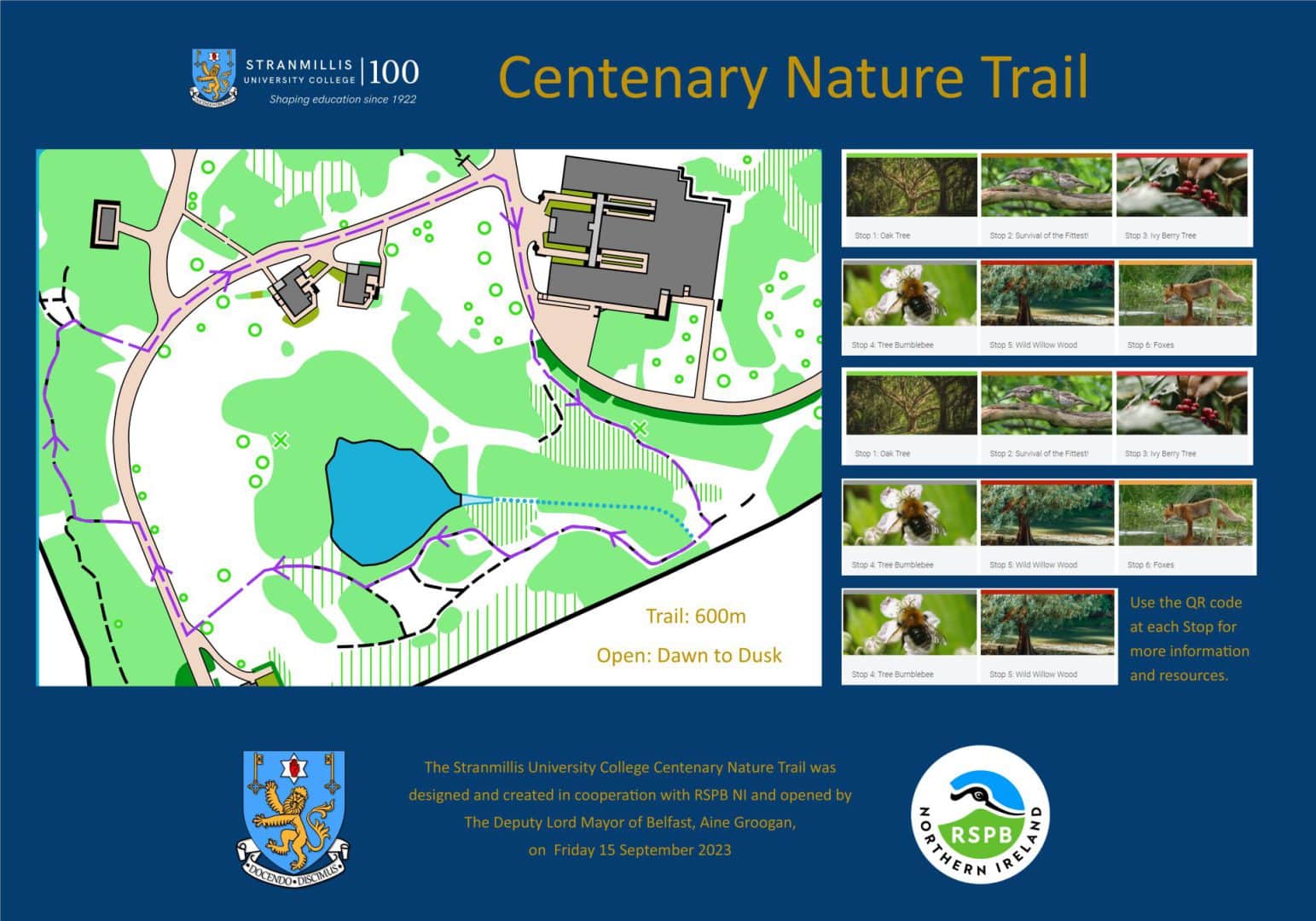Growing Up Online: Children’s Online Activities, Harm and Safety in Northern Ireland, a new research report from Stranmillis University College’s Centre for Research in Educational Underachievement (CREU), examines what children and young people enjoy doing online, what dangers they encounter, and what training and support they receive. The research was funded by the Safeguarding Board for Northern Ireland (SBNI).
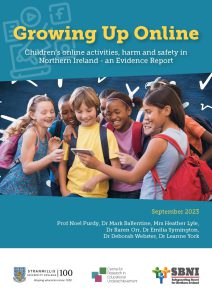 The report has been commissioned to inform the delivery of actions associated with the Northern Ireland Executive’s five-year Keeping Children and Young People Safe: An Online Safety Strategy – which is in year two of implementation.
The report has been commissioned to inform the delivery of actions associated with the Northern Ireland Executive’s five-year Keeping Children and Young People Safe: An Online Safety Strategy – which is in year two of implementation.
The publication will be launched at an event in Stranmillis University College on 21 September by Bernie McNally, the Independent Chair of the SBNI, and speakers will include Professor Noel Purdy Director of CREU and Principal Investigator of the research project; and Peter Toogood, Department of Health and Chair of the Child Protection Senior Officials Group. Some of the children and young people who participated in the large-scale research will attend the report launch, alongside a range of key stakeholders.
Two online surveys were administered to children and young people from across Northern Ireland, aged between 8-18 years. One version of the survey was administered to 8-13 year olds and another version to 14-18 year olds. The surveys remained open for 4 weeks from 6th February to 6th March 2023 and were completed by a total of 6481 children and young people, making this the largest such study ever carried out in Northern Ireland.
In addition, 95 participants took part in the qualitative aspects of this research, including children and young people in mainstream primary and post-primary schools, special schools and youth club settings, as well as parents, teachers/school leaders, and professionals working in the field of online safety. Participants included Traveller/Roma children, LGBTQI+ young people, children with severe learning difficulties, young people in a youth club setting in a disadvantaged urban context, and pupils from an Irish-medium school. The project was supported by two children and young people’s advisory groups (one primary and one post-primary).
The study found that:
- POSITIVE EXPERIENCES: Children and Young People in Northern Ireland reported a wide range of positive online experiences. They use a range of online devices (predominantly phones) which allow them to enjoy listening to music, watching videos, playing games, messaging friends and family, shopping, sharing photos, following celebrities/influencers, learning and much more. For children and young people, being online is absolutely integral to how they live almost every aspect of their lives today.
- TIME SPENT ONLINE: This study has also provided evidence that children and young people are spending many hours online each day, on school days but especially at weekends and during holidays. While most internet use is within reasonable limits (2-4 hours per school day), there is evidence that many children and young people are spending much greater amounts of time online (frequently more than 7 hours per day). The impact of this high usage, as reported by the young people and confirmed by their teachers, was a growing trend for pupils to come in to school “wrecked” or “in a complete state” or with their “heads down… sleeping” in class. All post-primary focus groups confirmed that this was commonplace and becoming more common, while 27% of the survey respondents (aged 14-18) reported feeling tired the next day as a result of their online activity at night.
- PARENTAL/CARER INTEREST: A further conclusion relates to the role played by parents (and/or carers) in supporting their children to grow up safe online. The findings of this study found a disparity between children and young people’s perceptions of their parents’ (often low) level of interest in what they were doing online, and the genuine fears and concerns expressed by the primary and post-primary parents who volunteered for the focus groups. For instance, only 17% of 8-13 year olds and just 8% of 14-18 year olds reported that their parents were ‘very interested’ in what they were doing online, while 20% of 8-13 year olds and 34% of 14-18 year olds felt that their parents were ‘not at all interested’ in their online activities.
- NEGATIVE EXPERIENCES: This study has found clear evidence that around 1 in 5 children and young people in Northern Ireland (20% of 8-13 year olds and 18% of 14-18 year olds) have experienced something nasty or unpleasant happening to them online over the past couple of months, most commonly on social media apps. This research has highlighted the wide range of online risks experienced by children and young people in Northern Ireland, especially 14-18 year olds. The results have also shown that girls are much more likely to experience something nasty or unpleasant online, both among the younger cohort (23% girls vs 17% boys) and the older cohort (20% girls vs 15% boys). For instance, among the older cohort (14-18 years old), girls (5.4%) were 3 times more likely than boys (1.7%) to be asked to send nude photos/videos of themselves, girls (6.9%) were more than twice as likely as boys (3%) to be sent inappropriate photos they didn’t ask for, and twice as likely to see or be sent pornography (girls: 5.6% vs boys 3.0%). Girls were also more likely to see or be sent content promoting self-harm (girls: 3.3% vs boys 2.2%), eating disorders (girls: 4.1% vs boys 1.6%) or suicide (girls: 3.6% vs boys 3.0%).
- TRAINING AND RESOURCES: While there were high levels of confidence in keeping themselves safe online among more than three-quarters of the children and young people, there is evidently a strong need to provide relevant, up-to-date, age-appropriate, supportive and engaging training and resources (in English and Irish) for children and young people, but also for parents and teachers/educators. This research has highlighted the benefits of children receiving online training, revealing that (across both age cohorts) children who had received online safety training were less likely to report recent negative online experiences happening to them than those children and young people who had not received any training.
- REGULATION: Finally, we would recommend that there is greater regulation of social media companies by government to help ensure: closer monitoring of online material that is potentially offensive or harmful to children and young people; more transparent, consistent and child-friendly online reporting mechanisms; the timely removal of offensive material; and stricter enforcement of age restrictions on certain apps or sites, where currently it is much too easy for children to enter a false date of birth.
Commenting on the findings, the chair of the Safeguarding Board for NI, Bernie McNally said:
“There is much to reflect on in the research findings, and in the views and voices of young people that are threaded through the report. It provides a uniquely detailed insight into how thousands of local children experience growing up online.
The report clearly presents the complex picture of children’s online activities, highlighting both the positive and negative experiences and risks that they face. It emphasises that we all have a role to play and action to take in helping children and families feel more secure, safe and supported online.”
Commenting on the findings, Peter Toogood, Deputy Secretary of Social Services Group, Department of Health and Chair of the Child Protection Senior Officials Group said:
“Research like this is crucial to understanding how children and young people in Northern Ireland experience the digital world and, as Chair of a cross-government child protection group, I welcome both the research and the report it has produced.
It is important that we recognise how integral the online world is to our children and the huge benefits it can provide. We must acknowledge that empowering our children to embrace the digital world while keeping them safe and providing them with the skills to keep themselves safe is a balancing act.”
Speaking about the report, Director of CREU and Principal Investigator of the research project, Professor Noel Purdy, said:
“This report sheds new light on how our children are growing up online and presents a wide variety of experiences, some encouraging, others disturbing. We hope that the findings presented in this report will provide a strong evidence base to inform future policy and practice around our children’s online lives as we seek to provide opportunities for them to enjoy safely all the benefits of their increasingly online lives.”
An Executive Summary of the report can be downloaded here.
The Full Report can be downloaded here.
 It was with sadness that the College learnt of the passing of a long-serving colleague and former Principal, Professor Richard McMinn, on Friday 3 November after a period of illness. Announcing the sad news to staff and former colleagues, Stranmillis Principal and CEO, Professor Jonathan Heggarty, said: “Professor McMinn was know personally by many current staff, having dedicated over thirty years of faithful service to the College until his retirement in 2007, serving as Principal for fourteen years during what was a very significant period of change for the College. Our condolences and thoughts are with his family and friends at this sad time.”
It was with sadness that the College learnt of the passing of a long-serving colleague and former Principal, Professor Richard McMinn, on Friday 3 November after a period of illness. Announcing the sad news to staff and former colleagues, Stranmillis Principal and CEO, Professor Jonathan Heggarty, said: “Professor McMinn was know personally by many current staff, having dedicated over thirty years of faithful service to the College until his retirement in 2007, serving as Principal for fourteen years during what was a very significant period of change for the College. Our condolences and thoughts are with his family and friends at this sad time.” Speaking about his time at Stranmillis and the impact he made, his successor as Principal of the College, Professor Anne Heaslett, said: “Professor Richard McMinn gave a lifetime of dedicated service to education in Northern Ireland. He was the first member of his family to benefit from a university education. His appreciation of gaining a place at Queen’s University, where he graduated with a BA in History (1968), signalled a lifetime commitment to opening educational opportunities for others. Completing his Dip Ed (QUB) he entered the world of teaching and a career primarily focused on roles within Stranmillis University College.
Speaking about his time at Stranmillis and the impact he made, his successor as Principal of the College, Professor Anne Heaslett, said: “Professor Richard McMinn gave a lifetime of dedicated service to education in Northern Ireland. He was the first member of his family to benefit from a university education. His appreciation of gaining a place at Queen’s University, where he graduated with a BA in History (1968), signalled a lifetime commitment to opening educational opportunities for others. Completing his Dip Ed (QUB) he entered the world of teaching and a career primarily focused on roles within Stranmillis University College.For the next fourteen years he presided over a period of change. As Northern Ireland emerged from conflict with the signing of the Good Friday /Belfast Agreement in 1998, it provided him with the ideal context in which to promote the concept of Mutual Understanding and partnership working. He was a firm believer that the education system should promote mutual respect and tolerance. This belief went beyond mere rhetoric. It was part of who he was – a gentleman and a professional of the highest integrity.



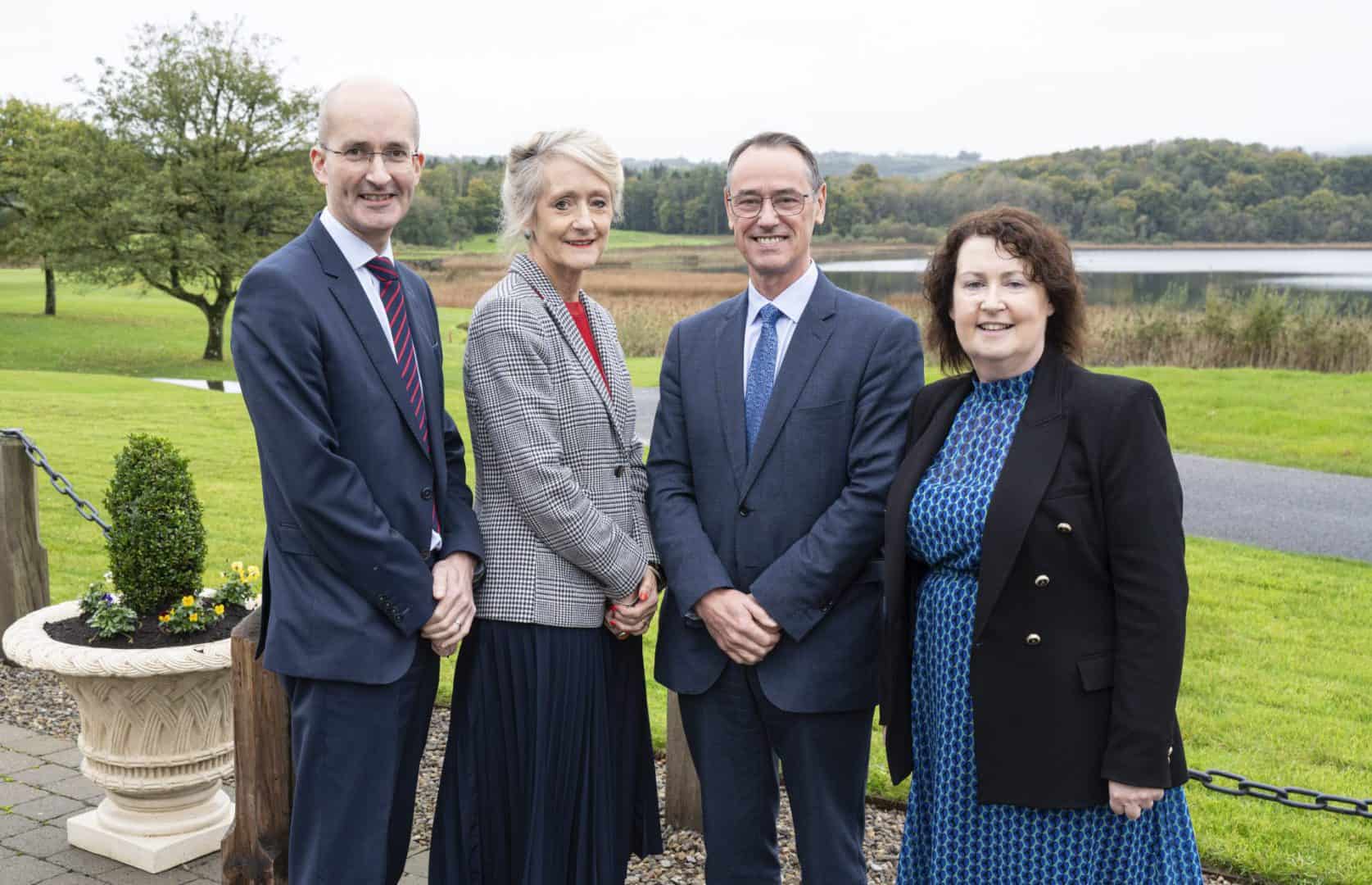
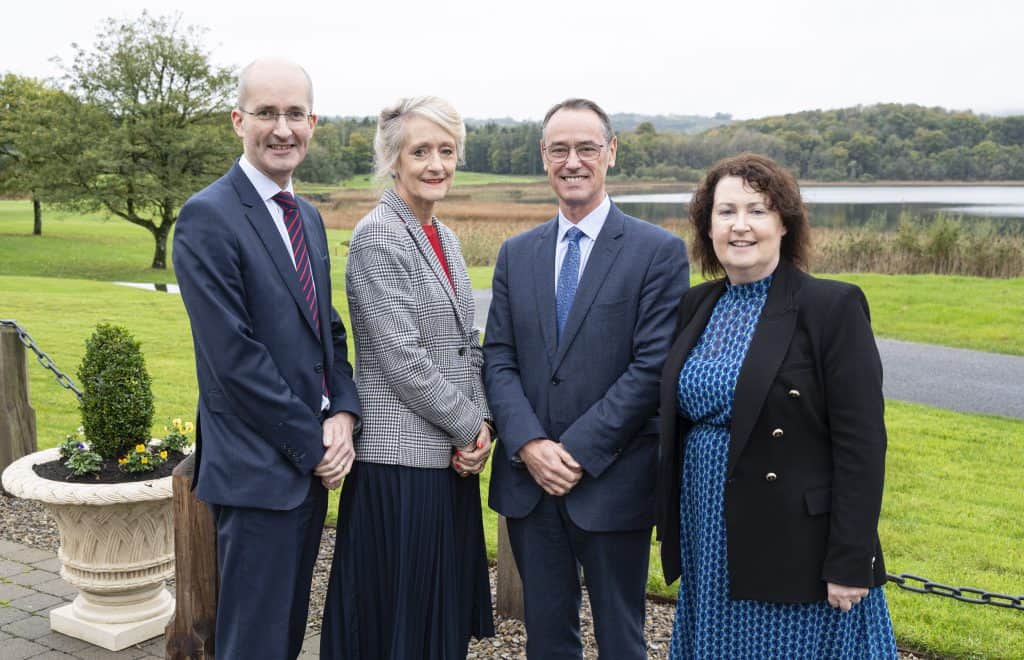
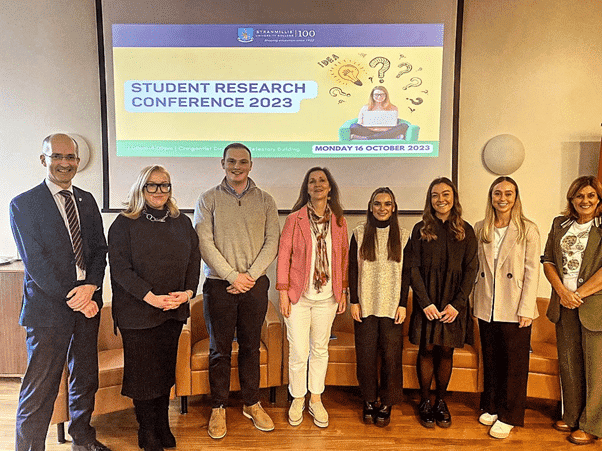
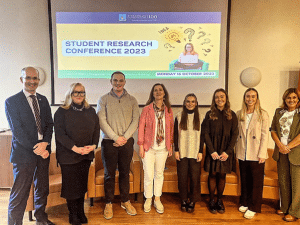 This year’s Student Research Conference was held on Monday 16th October in the Craigantlet Dining Room, Refectory Building. With more than 140 research methods in attendance, the conference provided guidance, encouragement and ideas as students think ahead to their final year dissertations.
This year’s Student Research Conference was held on Monday 16th October in the Craigantlet Dining Room, Refectory Building. With more than 140 research methods in attendance, the conference provided guidance, encouragement and ideas as students think ahead to their final year dissertations.


 The report has been commissioned to inform the delivery of actions associated with the Northern Ireland Executive’s five-year Keeping Children and Young People Safe: An Online Safety Strategy – which is in year two of implementation.
The report has been commissioned to inform the delivery of actions associated with the Northern Ireland Executive’s five-year Keeping Children and Young People Safe: An Online Safety Strategy – which is in year two of implementation.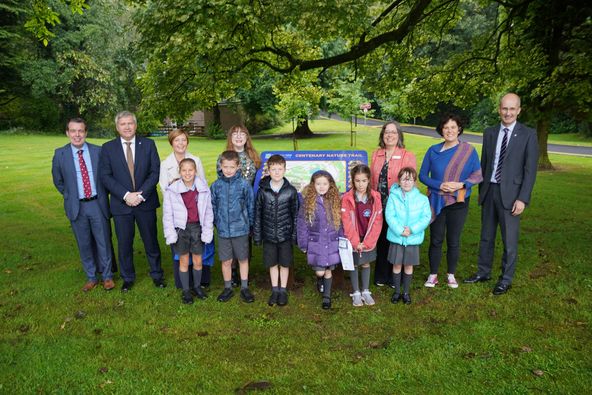
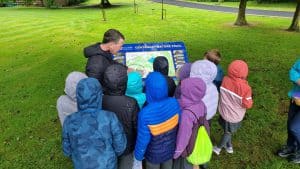 Speaking at the launch, Stranmillis University College Principal and CEO, Prof. Jonathan Heggarty said: ”The World Around Us is an area of learning in the primary and foundation stage curricula and an area where Stranmillis is a leader in research and the development of best and practice.”
Speaking at the launch, Stranmillis University College Principal and CEO, Prof. Jonathan Heggarty said: ”The World Around Us is an area of learning in the primary and foundation stage curricula and an area where Stranmillis is a leader in research and the development of best and practice.”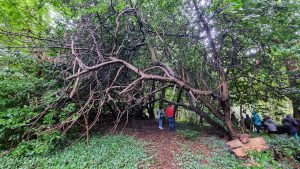 “Engaging, interactive educational resources such as this trail are a reminder that education extends beyond the classroom. This nature trail is more than just a beautiful path winding through our campus; it’s an educational journey, with information stops and QR codes linked to informative and engaging digital resources, designed in cooperation with RSPB NI to provide an interactive, teacher-led outdoor learning experience that will be enjoyed by schools, education providers and wider community groups for years to come.”
“Engaging, interactive educational resources such as this trail are a reminder that education extends beyond the classroom. This nature trail is more than just a beautiful path winding through our campus; it’s an educational journey, with information stops and QR codes linked to informative and engaging digital resources, designed in cooperation with RSPB NI to provide an interactive, teacher-led outdoor learning experience that will be enjoyed by schools, education providers and wider community groups for years to come.”